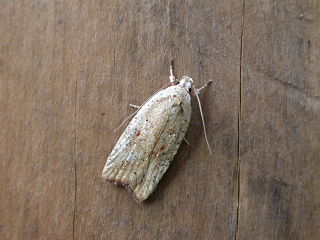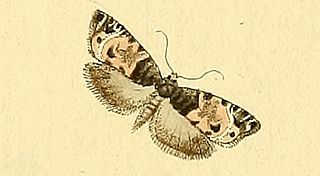
Notocelia uddmanniana, the bramble shoot moth, is a moth of the family Tortricidae. It is found in Western Europe and the area surrounding the Mediterranean Sea all the way up to the Caucasus, Kazakhstan, Iran and China.

Cataclysta lemnata, the small china-mark, is a moth species of the family Crambidae. It is found in Europe, Morocco and Iran.

The gorse tip moth is a smallish moth species of the family Depressariidae.

Parornix anglicella is a moth of the family Gracillariidae. It is widespread in: Europe including Albania, Austria, Belarus, Belgium, Bosnia and Herzegovina, Britain, Bulgaria, Croatia, Corsica, Czech Republic, Danish mainland, Estonia, Finland, French mainland, Germany, Hungary, Ireland, Italian mainland, Latvia, Lithuania, Luxembourg, Montenegro, North Macedonia, Norwegian mainland, Poland, Portuguese mainland, Romania, central and northern Russia, Sardinia, Serbia, Sicily, Slovakia, Slovenia, Sweden, Switzerland, Netherlands, Ukraine. Outside Europe it is recorded from the Near East and Nearctic realm.

Adela croesella is a moth of the family Adelidae. It is found in most of Europe.

Anarsia spartiella, the Wanstead grey, is a moth of the family Gelechiidae. It is found in most of Europe.

Agonopterix purpurea is a moth of the family Depressariidae. It is found in most of Europe.

Agonopterix subpropinquella is a moth of the family Depressariidae. It is found in most of Europe.

Agonopterix yeatiana is a moth of the family Depressariidae. It is found in most of Europe.

Pammene populana, the pygmy piercer, is a species of moth of the family Tortricidae. It is found in most of Europe, except Portugal, the Balkan Peninsula and Ukraine. The habitat consists of woodland, marshes, riverbanks, fens and sand dunes.

Epinotia nemorivaga, the bearberry bell, is a species of moth in the family Tortricidae. It is found in Europe and Asia.

Eucosma aspidiscana, the golden-rod bell, is a species of moth of the family Tortricidae. It is found in China, Mongolia, Korea, Japan, Russia, North Africa and most of Europe. The habitat consists of woodlands, downland, waste grounds and cliffs.

Notocelia incarnatana, the chalk rose bell, is a species of moth of the family Tortricidae. It is found in China, Mongolia, Japan, Russia, Kazakhstan and Europe, where it has been recorded from most of the continent, except parts of the Balkan Peninsula.
Prionapteryx scitulellus is a moth in the family Crambidae described by Francis Walker in 1866. It is found in India, Sri Lanka and Kenya.
Tabidia strigiferalis is a moth in the family Crambidae. It is found in China, Korea and Russia.
Pilocrocis pterygodia is a moth in the family Crambidae. It was described by George Hampson in 1912. It is found in Ghana, South Africa, Uganda and Zimbabwe.
Syllepte attenualis is a moth in the family Crambidae. It was described by George Hampson in 1912. It is endemic to Kenya.
Syllepte eriopisalis is a moth in the family Crambidae. It was described by Francis Walker in 1859. It is found on Borneo and in India.
Tylostega tylostegalis is a moth in the family Crambidae. It was described by George Hampson in 1900. It is found in the Russian Far East and western China.
Agriophara curta is a moth in the family Depressariidae. It was described by Thomas Pennington Lucas in 1900. It is found in Australia, where it has been recorded from Queensland.












